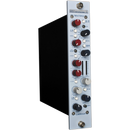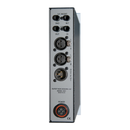Description
Inductor EQ / Compressor
The 5051 combines a classic three band EQ based on Rupert’s vintage designs with the power and flexibility of the Portico II compressor. Utilizing a fully-discrete, class-A signal path and high performance input and output transformers, the 5051 delivers the performance and musicality expected from a Rupert Neve Design.
The Equalizer
The EQ design on the 5051 evokes sonic similarities with some of Rupert’s classic EQs. The 5051 uses a custom tapped inductor with selected capacitors to form the mid range equalizer band, and the shelf curves are based on Rupert’s vintage modules, including very similar frequency choices. Each EQ section also uses low feedback class-A discrete electronics to prevent low level artifacts and harshness from detracting from the tonal shaping. The EQ, however, is a modern design with advantages offered by techniques that were not possible 35 years ago along with improvements in electronic components currently available, and should not be considered a clone. Let’s just say it has heritage.
The Compressor
The 5051 Compressor also features a discrete class A signal path proven used in the Portico Series, with individually controllable threshold, attack, release, makeup gain, ratio, side chain HPF, Feed-Forward / Feed-back selection and Peak/RMS detection modes. With the compressor inactive, the 5051 may be used as a transformer-coupled, high-performance line amplifier, and two 5051’s may be linked for stereo operation as well.
MIC GAIN
A 12-way precision rotary switch controls gain from 0 to 66 dB in 6 dB steps.
TRIM
Continuously variable +/-6 dB level control.
+48V
Engages phantom power on the microphone input, as supplied by the 500 series rack.
POLARITY
Push button inverts the polarity of the signal path, and illuminates when engaged. The symbol “Ø” is often used to denote opposite polarity.
HIGH PASS FILTER
The high pass filter is continuously variable from 20-250Hz and engaged by the HPF switch, which illuminates when engaged. It is a valuable aid in any signal chain, but particularly so in a microphone preamplifier. Signals below the selected frequency are attenuated at a rate of 12db / octave, getting rid of proximity effect, building rumble, air handling, motor hum, etc.
SILK / TEXTURE
Pushing the Silk button engages the red Silk circuit, which reduces the negative feedback on the output transformer, adding harmonic content as the texture is increased. Red Silk accentuates the saturation in the mid and high frequencies, similar to that of the red silk mode on the Portico II Channel. By manipulating the Texture control, the amount of Silk can be changed from essentially absent, to roughly 10 times the amount of coloration / distortion found in Silk from the original Portico Series. With Silk / Texture engaged, the distortion characteristic and harmonic content of the unit are very reminiscent of many of Rupert’s class-A vintage designs.
LEVEL METER
An Eight-segment LED bar-graph meter displays output level (pre-Silk). The color range proceeds from green for lower level signals, yellow for intermediate signals, and red for high levels. When the 511 is clipped, the highest red LED will hold longer depending on how far above the clip threshold the signal was.
Payment & Security
Your payment information is processed securely. We do not store credit card details nor have access to your credit card information.




